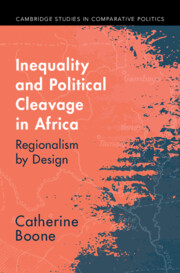Book contents
- Reviews
- Inequality and Political Cleavage in Africa
- Cambridge Studies in Comparative Politics
- Inequality and Political Cleavage in Africa
- Copyright page
- Epigraph
- Contents
- Figures
- Tables
- Preface and Acknowledgments
- 1 Economic Inequalities and Territorial Oppositions in African Politics
- 2 Region and Regionalism in African Politics
- 3 Endowment, Institutions, and Spatial Inequality
- 4 Regional Blocs and Bloc Voting in National Elections
- 5 Regional Hierarchies and Winning Coalitions
- 6 Territorial Oppositions in African Politics
- 7 Regionalism and the National Agenda
- 8 Conclusion
- Appendices
- References
- Index
- Cambridge Studies in Comparative Politics
2 - Region and Regionalism in African Politics
Published online by Cambridge University Press: 18 April 2024
- Reviews
- Inequality and Political Cleavage in Africa
- Cambridge Studies in Comparative Politics
- Inequality and Political Cleavage in Africa
- Copyright page
- Epigraph
- Contents
- Figures
- Tables
- Preface and Acknowledgments
- 1 Economic Inequalities and Territorial Oppositions in African Politics
- 2 Region and Regionalism in African Politics
- 3 Endowment, Institutions, and Spatial Inequality
- 4 Regional Blocs and Bloc Voting in National Elections
- 5 Regional Hierarchies and Winning Coalitions
- 6 Territorial Oppositions in African Politics
- 7 Regionalism and the National Agenda
- 8 Conclusion
- Appendices
- References
- Index
- Cambridge Studies in Comparative Politics
Summary
This chapter situates this book’s conceptual and theoretical approach with respect to earlier work on ethnicity and region in African countries and beyond. Earlier work has looked away from regional economic inequality as a political force in Africa, defaulting to theories centered on ethnicity, understood as a force orthogonal to programmatic policy interests and devoid of economic ideology. This work inverts these arguments, showing that regional economic inequalities and differentiation give rise to political cleavage and divergent policy interests. In Africa, the sources of subnational (regional) economic difference and inequality lie in unevenness of natural endowment, regionally specific patterns of state intervention in the economy that date to the colonial period, spatial–sectoral differentiation, and administrative structure. This chapter follows Lipset and Rokkan (1967) in theorizing the sources and nature of regional cleavages that arise in the course of state-building and national economic integration. It identifies institutions that contribute to the “regionalization” of national economies and politics in African countries. Section 2.5 of this chapter lays out the main elements of an approach to the analysis of regionalism that is fit for African contexts.
Keywords
- Type
- Chapter
- Information
- Inequality and Political Cleavage in AfricaRegionalism by Design, pp. 25 - 47Publisher: Cambridge University PressPrint publication year: 2024



